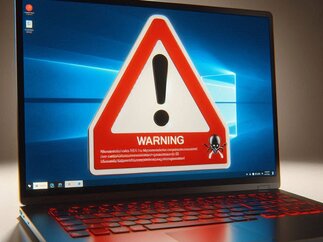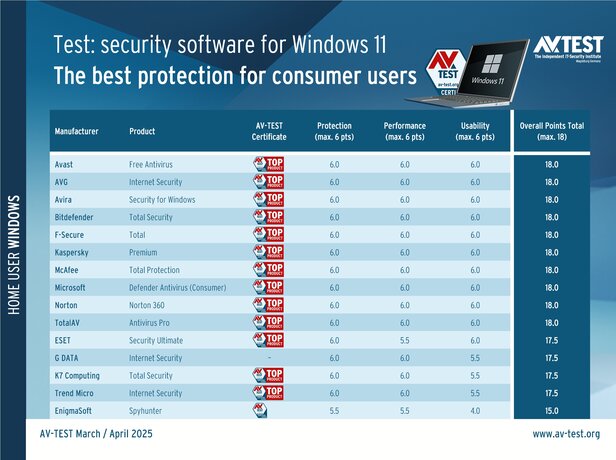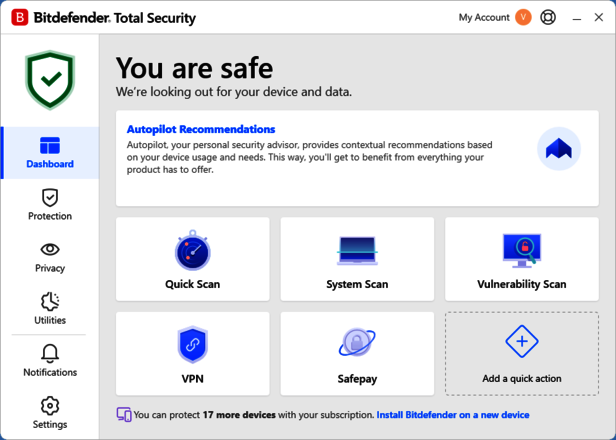More cybersecurity for Windows 11 systems
Cyber attacks targeting Windows systems show no signs of slowing down: new malware variants crop up every second, posing a challenge to security solutions. To find out which products can hold up under this pressure, AV-TEST put 15 security packages for Windows 11 to the test. In the test, they were required to detect and fend off just under 20,000 malware programs – and at the same time properly treat some 900,000 harmless files without slowing down the system. The results clearly show which products for Windows 11 PCs are up to the task and which still need improvement.
Unfortunately, cyber attackers are interested in every user they can find on the Internet. Thus, many phishing attacks are mass-targeted in order to steal passwords and sell user accounts. Or they commandeer Windows PCs into botnets, forced to send spam, distribute malware or mine cryptocurrency – all lucrative enterprises for cyber criminals. Yet users are not left unprotected against these dangers: powerful security software can detect and fend off attacks at an early stage.
The lab at AV-TEST examined how effectively the security packages available on the market can fortify the systems against all possible types of malware. In its two-month test, from March to April 2025, the experts evaluated 15 security solutions in terms of protection, performance, and usability. A product can earn up to six points in each area, which means a total of 18 points. All products attaining a final result of 17.5 to 18 points, in addition to receiving a “Certified“ certificate for tested security, also earn further recognition as a TOP PRODUCT.
To make them more comprehensible and transparent, the tests are conducted according to the AMTSO (Anti-Malware Testing Standards Organization) standard. In this international organization, recognized tests are known for the fact that the test methods uphold the specified standards in terms of objectivity, quality and relevance of anti-malware tests. That is why each test is documented with a reference number in a database.
Included in the test were 15 solutions from the following vendors: Avast, AVG, Avira, Bitdefender, EnigmaSoft, ESET, F-Secure, G DATA, K7 Computing, Kaspersky, McAfee, Microsoft, Norton, TotalAV and Trend Micro.
15 security packages face off against nearly 20,000 malware samples
In the test for protection under Windows 11 Pro, the testers used a standard with two segments. In the real-world test, the testers use newly found malware samples from the Internet and from emails. The packages were required to neutralize nearly 500 samples of this so-called 0-day malware. In the second segment involving the reference set, the object was to detect and fend off nearly 19,000 selected Trojans, worms etc. These digital parasites have been circulating on the Internet for a short time and ought to be known to Windows defense specialists. As both tests ran for two months, the detection table contains four results.
Of the 15 products tested, 13 filtered out all attackers in all test months and in both test segments absolutely error-free; hats off! For this, they earned the full 6 points. The package from K7 Computing also virtually achieved this, as the solution only made very minor errors in the test. In the initial test month in both segments, the package achieved 99.9% and 99.7% respectively – otherwise 100%.
Only Spyhunter from EnigmaSoft let a few too many attackers through in 3 out of 4 test segments. Its figures were 99.1, 99.4 and 99.9 percent, and in the second test segment in the last month it was 100 percent. This resulted in a minor deduction – with a final score of 5.5 points.
Slowing down is not an option
Many users invest a lot of money in a fast Windows PC. If security software then slows down its performance, this quickly leads to deactivation. The lab analyzes each package to see how heavily it puts a load on the Windows system and consumes resources for its protection service. The lab uses two reference PCs for the test: one with basic hardware, the other a high-end PC. On both systems, the testers surfed 500 websites, downloaded software, installed it and launched the apps. The testers also copied data onto the PCs locally and onto a network. The times for all these operations were then used as reference values. In the further course of the test, the testers each installed security software and repeated the whole procedure. The comparative additional time required yielded the performance score.
Most of the security apps also performed really well in this test segment. With virtually no measurable impact on system performance, 13 of the 15 tested products earned the highest possible score of 6 points.
Only ESET and EnigmaSoft lost half a point in the ranking. Both put a slight load on the Windows system and held up individual programs unnecessarily. They received 5.5 points for their performance.
Red alert – or was it nothing?
The third major test category, usability, mainly involves false positives. The testers sent almost 900,000 innocuous applications to the test computers and had them analyzed. In addition, the lab experts installed dozens of popular software applications and launched them under Windows. Finally, the testers visited 500 harmless websites. In an ideal scenario: there is no alarm and nothing is blocked.
The result for most of the products was excellent: of the 15 products tested, 11 performed completely flawlessly. False positives were reported in single instances, in one out of 900,000 applications. That is forgivable. These products also received the full 6 points.
The packages from G DATA, K7 Computing and Trend Micro each incurred a minor deduction and thus scored 5.5 points. They committed between 4 and 7 errors in the test.
Only EnigmaSoft was an outlier, blocking or deleting well over 20 files in the test. It cost the product two points, meaning it only earned 4 of the 6 points possible in this area.
Great protection for Windows 11
The current test demonstrates that the market offers a wealth of reliable security packages. In this test, 10 products achieved the maximum 18 points and 4 others a remarkable 17.5 points. They all deserve the additional TOP PRODUCT award for this outstanding performance. However the package from G Data was solely tested for comparison purposes and was not awarded a certificate – even if it met the requirements based on performance.
The ranks of packages scoring 18 points also included the embedded Windows protection Defender Antivirus. This was a strong performance, therefore offering excellent protection. However, the test does not take into account in its evaluation what other functions or services the security packages offer that Windows does not have internally.
The routine ATP – Advanced Threat Protection tests are an excellent supplement to this test. The testers evaluate the live attack of 5 ransomware and 5 data stealer samples. Many of the packages examined in this Windows test also passed the ATP tests under Windows.


















